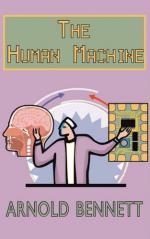And yet, mark me! That man will not have been an hour on his feet on this difficult earth before the machine has unmistakably gone wrong: the machine which was designed to do this work of living, which is capable of doing it thoroughly well, but which has not been put into order! What is the use of consulting the map of life and tracing the itinerary, and getting the machine out of the shed, and making a start, if half the nuts are loose, or the steering pillar is twisted, or there is no petrol in the tank? (Having asked this question, I will drop the mechanico-vehicular comparison, which is too rough and crude for the delicacy of the subject.) Where has the human machine gone wrong? It has gone wrong in the brain. What, is he ‘wrong in the head’? Most assuredly, most strictly. He knows—none better—that when his wife employs a particular tone containing ten grains of asperity, and he replies in a particular tone containing eleven grains, the consequences will be explosive. He knows, on the other hand, that if he replies in a tone containing only one little drop of honey, the consequences may not be unworthy of two reasonable beings. He knows this. His brain is fully instructed. And lo! his brain, while arguing that women are really too absurd (as if that was the point), is sending down orders to the muscles of the throat and mouth which result in at least eleven grains of asperity, and conjugal relations are endangered for the day. He didn’t want to do it. His desire was not to do it. He despises himself for doing it. But his brain was not in working order. His brain ran away—’raced’—on its own account, against reason, against desire, against morning resolves—and there he is!
That is just one example, of the simplest and slightest. Examples can be multiplied. The man may be a young man whose immediate future depends on his passing an examination—an examination which he is capable of passing ‘on his head,’ which nothing can prevent him from passing if only his brain will not be so absurd as to give orders to his legs to walk out of the house towards the tennis court instead of sending them upstairs to the study; if only, having once safely lodged him in the study, his brain will devote itself to the pages of books instead of dwelling on the image of a nice girl—not at all like other girls. Or the man may be an old man who will live in perfect comfort if only his brain will not interminably run round and round in a circle of grievances, apprehensions, and fears which no amount of contemplation can destroy or even ameliorate.
The brain, the brain—that is the seat of trouble! ‘Well,’ you say, ’of course it is. We all know that!’ We don’t act as if we did, anyway. ‘Give us more brains, Lord!’ ejaculated a great writer. Personally, I think he would have been wiser if he had asked first for the power to keep in order such brains as we have. We indubitably possess quite enough brains, quite as much as we can handle.




